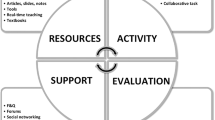Abstract
At SUNY Downstate, something different has been implemented—the Course/Faculty Assessment program (CFA). The CFA is a student team assessment program which evaluates both courses and associated faculty instructors. The goal of the CFA is to examine the curriculum as experienced by students. In other words, the CFA gets at what the learning experience is like for those doing the learning. Participants are asked to take ethnographic notes, recording anything noteworthy as they attend classroom sessions and labs. This process sets the CFA program apart from many conventional assessments in that students write down their concerns in situ, as they go through their day, rather than relying on recall at the end of the course and then group members meet to discuss their findings throughout the course. More than 80% of student recommendations have been put in place. This high number indicates that students comments are on-point and students make excellent recommendations. Futher, schools are listening and those meaningful suggestions are put into practice. The Course/Faculty Assessment Program has successfully created a culture of assessment. Faculty and administrators are more than simply receptive to student views, they eagerly await their comments. The CFA has changed the way data is gathered and how it is used. It has changed our students, faculty, and administrators.

Similar content being viewed by others
References
Middaugh MF. Planning and assessment in higher education: demonstrating institutional effectiveness. 1st ed. San Francisco Ca: Jossey-Bass; 2010.
University of North Carolina at Chapel Hill School of Medicine/Student Evaluation of Courses, OME MS1_2 Course Evaluation. 2016. Retrieved from https://www.med.unc.edu/ome/academicaffairs/assessment-and-evaluation/evaluation/curriculum-and-course-evaluation/faqs-about-evaluation-of-ms1-and-ms2-courses. Accessed 6 Sept 2017.
Mucha S. A robust process for account acquisition in electronics manufacturing services. In: find it. Book it. Grow it. Printed Circuit Design & Fab Year http://asq.org/qualitynews/qnt/execute/displaySetup?newsID=16782 . Accessed 29 Aug 2017
Stark PB, Freishtat R. An Evaluation of Course Evaluations. ScienceOpen. 2014; https://doi.org/10.14293/S2199-1006.1.SOR-EDU.AOFRQA.v1.
Thorpe, S. W.“Online student evaluation of instruction: an investigation of non-response bias,” paper presented at the 42nd Annual Forum of the Association for Institutional Research, Toronto: June, 2002.
Adams, M.J.D. No evaluation left behind: nonresponse in online course evaluations. Doctoral dissertation, Educational Research and Analysis, North Carolina State University; 2010.
Astin AW, Antonio AL. Assessment for excellence. second ed. Maryland: Rowman & Littlefield Publishers, Inc; 2012.
Krathwohl DR. Methods of educational and social science research: an integrated approach. 2nd ed. Illinois: Waveland Press Inc; 1998.
Deming, E. Out of the crisis. Boston: MIT Press; 2000.
Viggiano, T., & El-Swi, N. Applying principles of continuous quality improvement in the course evaluation process. In IAMSE Webinar Series 2008. http://www.iamse.org/development/2008/was_111208.pdf. Accessed Sept 10 2017.
Uttl B, White C, Gonzalez DW. Meta-analysis of faculty’s teaching effectiveness: student evaluation of teaching ratings and student learning are not related. Studies in Educational Evaluation. 2017;54:22–42.
Author information
Authors and Affiliations
Corresponding author
Rights and permissions
About this article
Cite this article
Granat, B.M. Course/Faculty Assessment (CFA): a Student Team Approach to Course and Faculty Assessment. Med.Sci.Educ. 28, 439–443 (2018). https://doi.org/10.1007/s40670-018-0553-2
Published:
Issue Date:
DOI: https://doi.org/10.1007/s40670-018-0553-2



